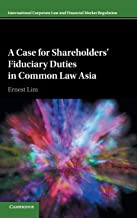 Author: Ernest Lim
Author: Ernest Lim
Publisher: Cambridge University Press – 628 pages
Book Review by: Sonu Chandiram
To understand why this book was written, it is best to quote the author himself:
“This book challenges us to rethink the meaning and implementation of the long-term success of the company and shows how corporate governance should and could be made.”
Professor Ernest Lim goes further to underscore the importance of the general meeting by asserting at the outset of his book:
“This book re-conceptualizes the importance of the general meeting and the shareholders in the listed companies in four leading common law jurisdictions in Asia (Singapore, Hong Kong, India, and Malaysia) as one that should include fiduciary duties. It demonstrates why, when, by whom, and how fiduciary duties should be imposed and how they could be enforced.”
Lim contends that this book “refutes the common-law rule that shareholders can generally vote as they please.” He points out that the interests of the company should be paramount, which he reminds us, is a central notion in corporate law. Further, this book:
- Addresses the deficiencies in corporate law regulating conflicts of interest involving controlling shareholders and institutional shareholders
- Challenges us to rethink the meaning and implementation of the long-term success of the company and shows how corporate governance should and could be enforced
- Provides solutions to the problem of activist and passive minority influential investors
These and numerous other matters are discussed and possible resolutions are discussed throughout the book in the following chapters that constitute the contents of this work of over 600 pages:
- Part I – Introduction and Overview
- Introduction
- Common Law Jurisdictions in Asia: An Overview
- Role of General Meeting and Shareholders
- Powers, Shareholders, and Justifications for Duties
- Objections
- Part III – The Mechanics of Imposing Duties
- ‘What’, ‘Whom’, ‘When’, ‘Who’ and ‘How’
- Enforcement
- Concluding Remarks
The author provides scholarly legal research and precedence to support the various points he makes in this book, in the form of numerous cases argued, as well as regulations and legislation passed in Asian countries (Hong Kong, India, Malaysia, and Singapore), in the European Union (Germany and the United Kingdom) and in the United States.
This is a well-researched and highly documented work that is an asset for anyone who is concerned with the issues of corporate governance, particularly with the fiduciary duties of shareholders the world over, and particularly in Asia.
Author:
Ernest Lim is an associate professor in the Faculty of Law at National University of Singapore (NUS). His main research interest is comparative corporate law and governance. He is also interested in private law and its relationship with public law, as well as legal aspects of artificial intelligence.
He has held visiting appointments at Columbia University, the Max Planck Institute, the University of Oxford, and Tel Aviv University. A graduate of the University of Oxford (DPhil and BCL), Harvard Law School (LLM), and NUS (LLB), he practiced corporate law in New York and Hong Kong prior to entering academia. He is the author of Sustainability and Corporate Mechanism in Asia (Cambridge University Press – 2020).






